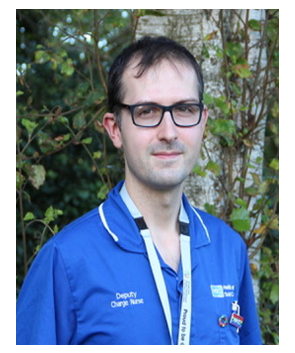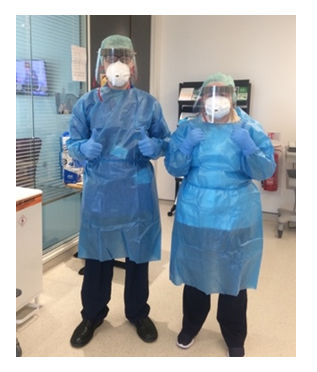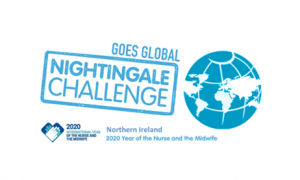Helping Patients with Non-curable Advanced Disease, and their Families, to have the Best Possible End-of-Life
Andrew Tumilson, Deputy Charge Nurse, Ulster Hospital, South East Health and Social Care Trust, Northern Ireland
 Dying Matters Awareness Week is an important annual event that gives professionals, patients and their families the opportunity to come together and open up the conversation around death, dying and bereavement. This particularly resonated with me in 2020/21 as the Covid-19 pandemic has clearly had and continues to have a devastating impact on individuals and their families. Working in palliative and end-of-life care, the pandemic has highlighted how important it is to know the wishes of your loved ones especially where restrictions or the speed of the disease may not allow for the opportunity to have these conversations in the final hours or days of life.
Dying Matters Awareness Week is an important annual event that gives professionals, patients and their families the opportunity to come together and open up the conversation around death, dying and bereavement. This particularly resonated with me in 2020/21 as the Covid-19 pandemic has clearly had and continues to have a devastating impact on individuals and their families. Working in palliative and end-of-life care, the pandemic has highlighted how important it is to know the wishes of your loved ones especially where restrictions or the speed of the disease may not allow for the opportunity to have these conversations in the final hours or days of life.
The Northern Ireland Statistics and Research Agency report in January 2019 highlights that 66% of people still died in either a hospital or Care Home setting over the past ten years [www.nisra.gov.uk]. Here in Northern Ireland, end-of-life care is provided by a range of professionals including hospital teams, district nursing teams, Marie Curie nurses, Care Homes and Hospices. The evidence indicates that individuals and their loved ones frequently have not had these often difficult conversations about death and dying, due to embarrassment, anxiety or fear. If no conversations have already taken place then the delicate responsibility falls on the health and care team or lead professional. In this situation any health professional caring for patients with non-curable advanced disease already admitted into hospital will have a sensitive and timely conversation with the individual and family to inform advance care planning, so that all identified needs are met. If the clear wish of the individual is to be discharged home safely, with the right support, then every effort will be made to ensure in their final days the individual has timely access to the right medications, equipment and healthcare support from local teams to facilitate a safe discharge from hospital back into the home setting.
As an experienced Registered Nurse, I recognise the importance of building relationships with patients who have non-curable advanced disease, and their families. Since qualifying as a nurse from Belfast University in 2009, through to my current role as a Deputy Charge Nurse, I have developed a passion for raising standards in providing high quality person-centred care with a focus on palliative and end-of-life care. My ambition is to contribute to ensuring all patients’ needs are met by focussing on ‘what matters to them’ not ‘what is a matter with them.’
I am currently privileged to be a participant on the Nightingale Challenge Northern Ireland Global Leadership Development Programme (NCNI GLDP) – an 18-month programme (as part of the  Nursing Now / Nightingale Challenge Global Campaign – funded by the Department of Health, Northern Ireland, led by Professor Charlotte McArdle, CNO, Northern Ireland and her team at the Department of Health, and Dr Catherine Hannaway, Global Health Consultant. As part of this programme, I am undertaking a Quality Improvement project, supported by the Quality Improvement team at South East Health and Social Care Trust and Maggie Morgan Cooke, Quality Improvement Facilitator for the programme. My project is in relation to ‘anticipatory prescribing’ and holistic assessment utilised at end-of-life care in order to maximise symptom management and respect patient’s wishes within our population if their wishes are to die at home. It is set up to be completed in 3 phases. The principle aims include ensuring there is seamless communication around the 24-hour clock amongst the healthcare team; transparency in respect of services available in both acute and community settings; maximising symptom control in the community and preventing avoidable hospital admissions for patients in the final hours of life.
Nursing Now / Nightingale Challenge Global Campaign – funded by the Department of Health, Northern Ireland, led by Professor Charlotte McArdle, CNO, Northern Ireland and her team at the Department of Health, and Dr Catherine Hannaway, Global Health Consultant. As part of this programme, I am undertaking a Quality Improvement project, supported by the Quality Improvement team at South East Health and Social Care Trust and Maggie Morgan Cooke, Quality Improvement Facilitator for the programme. My project is in relation to ‘anticipatory prescribing’ and holistic assessment utilised at end-of-life care in order to maximise symptom management and respect patient’s wishes within our population if their wishes are to die at home. It is set up to be completed in 3 phases. The principle aims include ensuring there is seamless communication around the 24-hour clock amongst the healthcare team; transparency in respect of services available in both acute and community settings; maximising symptom control in the community and preventing avoidable hospital admissions for patients in the final hours of life.
Against this background, I have collaborated with the Nurses and Nurse Practitioners Association in British Columbia Canada and colleagues across NHS Scotland to share learning and exchange ideas on how to improve choice and care for patients at the end-of-life. This also has meant the exchange of different policies and guidelines used in other parts of the world. In addition to the emotional, spiritual, mental and physical care that is provided for people in the dying stages of life, it is important to prepare for symptoms that may arise, including breathlessness, pain, agitation, anxiety (this list is not exhaustive). Symptoms can be managed through a range of interventions which may include medication. Having access to these medications in advance and not ‘just in time’ can help avert and manage any crisis that may arise.
As part of my collaboration with NHS Scotland colleagues, I had the privilege of shadowing nursing teams at NHS Forth Valley, in both acute and community settings and assisted the out-of-hours teams with direct clinical care with patients at end-of-life. I also had the opportunity to see how the NHS Forth Valley ‘Just-in-case’ boxes of anticipatory medications were utilised and set up in the community and in out-of-hours teams, and the associated documentation and policies created across the Hospital, Hospice and Community continuum in respect of end-of-life care. I have learnt from both my colleagues in Scotland and in Canada that in respect of anticipatory medications and advance care planning the most important thing to do is to start the conversation and ensure patient’s wishes are well documented.
Facing the challenges of the Covid-19 pandemic as a Deputy Charge Nurse, I needed to facilitate my team to changing working arrangements as an urgent (and ever changing) response to managing newly required infection control procedures and an increasing workload in the ward environment. Patients required additional support and reassurance as some were dealing with the fear of their diagnosis and even acquiring the Covid-19 virus during periods when they were receiving treatment and would be immunosuppressed as a result of both the disease processes and treatments to help manage the disease. In particular, I was humbled by being able to be an advocate for the niche of patients within my clinical area who were approaching the end of life and who wanted to be at home in their final days of life. We ensured they were swabbed for Covid-19 prior to leaving hospital and their symptoms managed appropriately. We ensured ‘holistic assessments’ were undertaken and reviewed and ensured they had adequate anticipatory medications prescribed to not only manage symptoms but to prevent avoidable hospital readmission. The Covid-19 restrictions have had a significant impact on families, carers and society as they have lost loved ones and may not have been able to say a final goodbye in person. Naturally this has impacted upon peoples’ grief and mental well-being including the professional staff. Relevant support services, counselling and virtual visiting has been accommodated throughout the pandemic, along with additional tools and support for staff through local employing organisations.
Whilst the world grieves the many losses brought about by the Covid-19 pandemic, including the very sad loss of many people’s lives (both health and social care staff and the communities we serve), we must strive to collectively and individually learn from this global disaster. It is important to reflect and learn together from the pandemic in many areas, including in palliative and end-of-life care – we need to get organised for the future and be prepared to open-up more the conversation surrounding end-of-life care. In doing so, we need to better accept that death is part of the life continuum and we should strive to create a culture where people’s ‘wishes’ are discussed and expressed early and recorded formally, so there can be clarity for everyone when people reach the final stage of their life. Taking my learning from the NCNI GLDP and the new skills and confidence that I have developed in leadership, quality improvement, global health, advocacy and having a ‘voice to lead’ is helping me to be a strong advocate and ‘agent for change’ in advancing this important area of work.


